Swimming World Magazine (May): Showstopping Kate Douglass Powered Virginia to NCAA Title; Lia Thomas Controversy Erupts
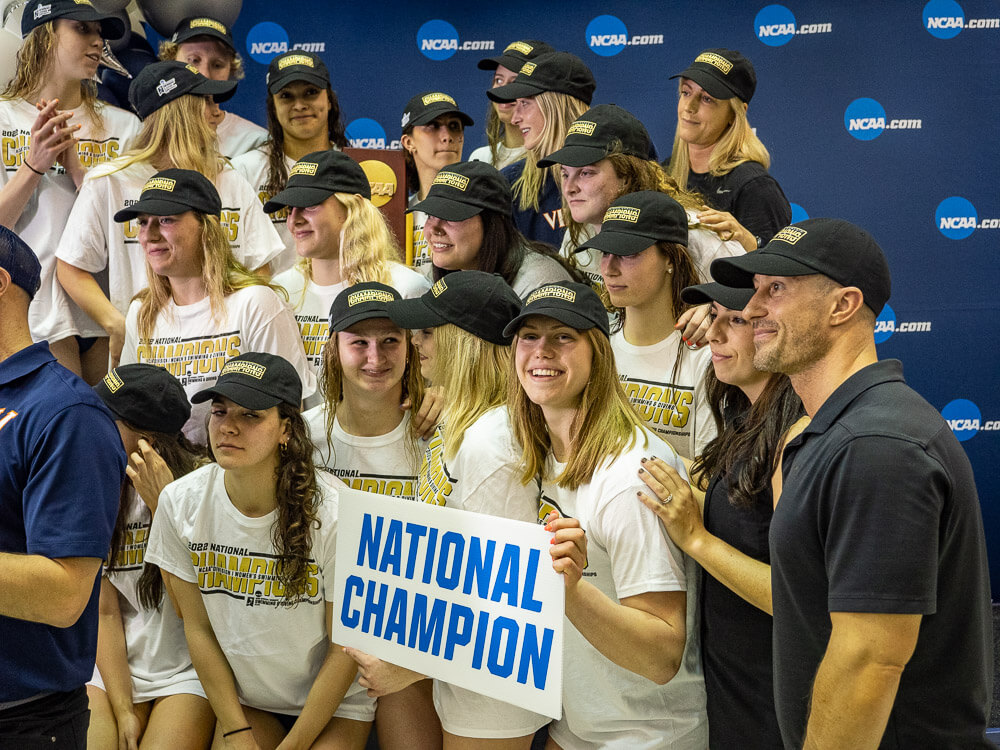
From the May issue of Swimming World Magazine, Kate Douglass was almost beyond words, leading Virginia to a second consecutive NCAA title.
Get Swimming World Magazine and Swimming World Biweekly FREE When You
Become A Member of the International Swimming Hall of Fame
New! 30 Day Membership to ISHOF AND Digital Swimming World Subscription for just $10 a month!
Want more? Get a 1 Year ISHOF Family Membership With Swimming World Print AND Digital Subscription Order Now!
Non-Subscribers Can Download This Issue Here
Last year, the University of Virginia won its first-ever NCAA women’s swimming and diving championship not only for the school, but for the ACC conference. A year later, the Cavaliers are now back-to-back champions.
THE TOP 10
1. VIRGINIA 551.5
2. TEXAS 406.0
3. STANFORD 399.5
4. ALABAMA 288.0
5. NC STATE 279.0
6. LOUISVILLE 196.5
7. MICHIGAN 184.5
8. CALIFORNIA 180.0
9. OHIO STATE 165.0
10. TENNESSEE 127.0
The Virginia women’s swimming and diving team came into this season ready to defend its title. The Cavaliers returned most of their point scorers from a year ago, and while they lost Olympian Paige Madden to graduation, they picked up two of the biggest young stars in the sport in Emma Weyant and Gretchen Walsh.
The result was another dominating performance by Virginia, although this one was dominating in a different way. Last year, the Cavaliers were head-and-shoulders above the field and dominated with points. This year, they continued to dominate with points, but the difference was in how they were winning.
Coach Todd DeSorbo’s women captured 11 of the 18 events and finished with 551.5 points, nearly 150 more than runner-up Texas (406), which stunningly held off a resurgent Stanford (399.5). Alabama moved up a spot from last year’s fifth-place showing to fourth (288), while NC State dropped from second to fifth (279).
Those 11 wins included four of the five relays, three individual wins from Kate Douglass, three from Alex Walsh and one from younger sister, Gretchen Walsh, who also finished runner-up in her two other events.
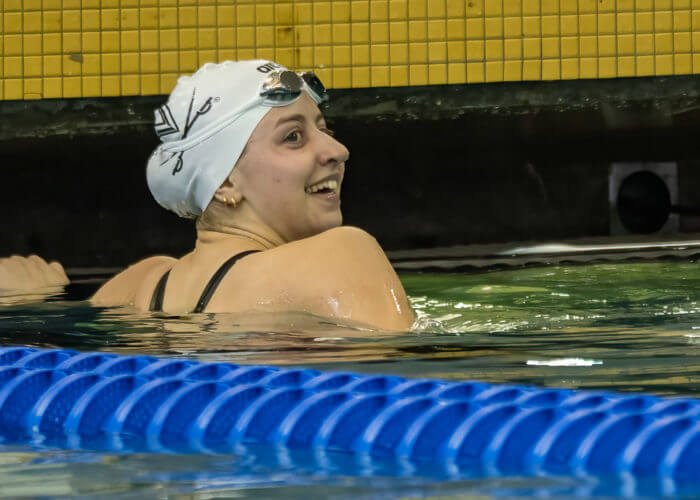
Photo Courtesy: Peter H. Bick
Douglass won the 50 yard freestyle (20.84), 100 butterfly (49.04) and 200 breaststroke (2:02.19), all in American record times—with the 50 free and 200 breast also breaking the NCAA, U.S. Open and meet records. Alex Walsh set an American/NCAA/U.S. Open/meet record in the 200 IM (1:50.08) before adding wins in the 400 IM (3:57.25) and 200 butterfly (1:50.79). Gretchen Walsh won the 100 freestyle (46.05) and was second in the 50 freestyle and 100 backstroke (although she was under the previous American record in the event as well).
That means that Virginia placed among the top two finishers in all but three swimming events!
The Cavaliers’ team of Gretchen Walsh, Alexis Wenger, Alex Walsh and Douglass tied their own American/NCAA/U.S. Open/meet record in the 400 medley relay, and then the quartet of Douglass, Alex Walsh, Reilly Tiltmann and Gretchen Walsh ended the meet by swimming the fastest time in history in the 400 freestyle relay (3:06.91).
“I think it’s pretty historic,” Alex Walsh said. “Four years ago, the Virginia women got ninth. The trend has just been exponential, and I don’t think any other team can say that they had the success that we have had.”
It adds up to stunning domination.
No swimmer in the history of the sport has set American records to win three different strokes in three different distances in the same meet, but Douglass did just that, cementing her legacy as one of the top college swimmers of all time—and her career isn’t over yet.
Walsh was nearly as dominant with three individual wins and an American/NCAA/U.S. Open/meet record…and…three relay wins, two of which also set the same records. In the third relay (200 freestyle), Walsh teamed with Douglass, Lexi Cuomo and Gretchen Walsh, to win in 1:24.96. Virginia’s other relay win came in the 200 medley with a team of Gretchen Walsh, Wenger, Cuomo and Douglass setting a meet record of 1:32.16.
Joining the Virginia party of record setters was NC State’s Katharine Berkoff, who clocked 48.74 in the 100 back for an American/NCAA/U.S. Open/meet record. That brought the total number of records broken (swimming and diving) to nine (seven by the Cavaliers): six American/NCAA/U.S. Open/meet, one American and two meet.
“All week long, we’ve talked about moments and trying to create fantastic moments for the team and create a great environment for the team,” DeSorbo said. “They just shocked me. Coming off the ACC Championships, I didn’t necessarily know if they could exceed what they did there. Certainly, they were significantly better here. They just blow my mind. They are great athletes and a great group of people. They create a bubble and don’t worry about what’s going on outside of it. They make this easy. They make my job really fun. And they’re why I’m sitting here. They’re the ones putting in the hard work.”
* * *
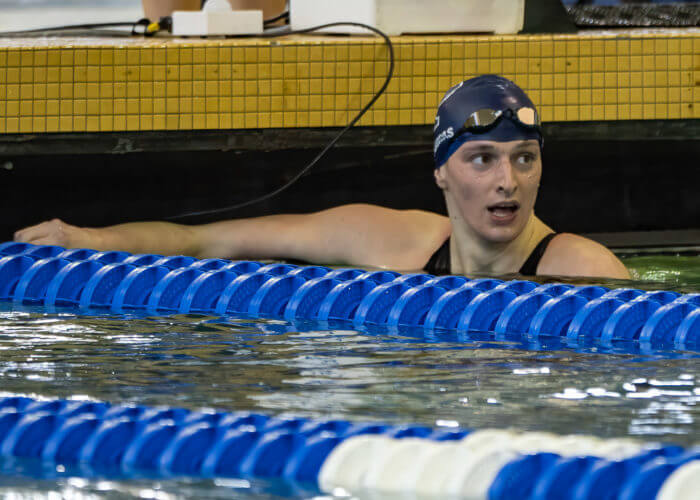
Photo Courtesy: Peter H. Bick
In addition to Virginia’s dominance, the other main storyline was Penn swimmer Lia Thomas, a transgender who swam for three years on the men’s team before going through a year of hormone therapy. The fifth-year swimmer won the 500 freestyle (4:33.24), ahead of Virginia’s Weyant, who also placed third in the 400 IM. Thomas also made the finals in the 100 free and 200 free, while a group of protesters gathered outside McAuley Aquatic Center at Georgia Tech to lobby for an even playing field for women. There was also a counter protest on the first full day of the meet with the message of protecting transgender athletes.
Other winners included Stanford’s Taylor Ruck in the 200 freestyle (1:41.12) and Regan Smith in the 200 backstroke (1:47.76). The duo also teamed with Torri Huske and Brooke Forde to win the 800 freestyle relay (6:48.30).
USC’s Kaitlyn Dobler won the 100 breaststroke (56.93) in the meet’s closest finish—just 4-hundredths of a second ahead of Virginia’s Wenger and 8-hundredths over last year’s 100 breast champion, Sophie Hansson of NC State. And Wisconsin’s Paige McKenna, a freshman, was involved in the largest margin of victory in an individual event, taking the 1650 by 5.10 seconds with a 15:40.84.
Minnesota diver Sarah Bacon claimed her fifth career NCAA title by winning the 3-meter board (409.25), while Miami’s Mia Vallee won the 1-meter diving (365.75, a meet record) and Indiana’s Tarrin Gilliland repeated on platform (372.95).
…………………………………………………………………………………………………………………….
IT WOULDN’T BE BACKSTROKE WITHOUT A BERKOFF
Katharine Berkoff has made her mark. The repeat champion in the 100 yard backstroke will go down in history as the first woman to break the 49-second barrier in the event after she won this year in 48.74 seconds.
How fast is she? Only three women have gone sub-50: The other two are Natalie Coughlin (49.97), who held the record from 2002-17, and Ally Howe (49.69), who bettered Coughlin’s standard 15 years later.
“It’s pretty crazy,” Berkoff said of becoming the first woman under 49. “My whole life, I’ve always wanted to do something like this. I’ve envisioned it, and to do it is so awesome.”
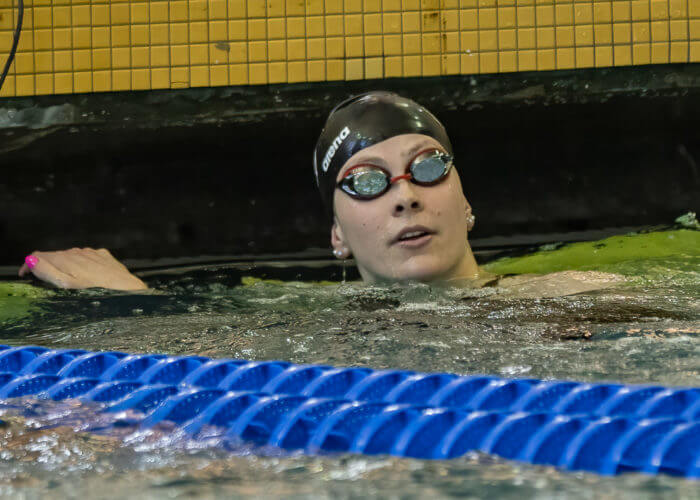
Photo Courtesy: Peter H. Bick
The junior swimmer from North Carolina State must have chlorine in her veins and the backstroke in her DNA. Her father, David Berkoff, is a two-time Olympian and four-time Olympic medalist. And like his daughter, David was a two-time NCAA champion in the 100 back, swimming for Harvard and winning in 1987 and 1989.
It goes without saying that the younger Berkoff had quite the impressive foundation to build upon.
“I think it is pretty fun. I think the reason I have always had such high goals in swimming is because of my dad,” Berkoff said. “I always knew I wanted to do what he did. It has been more motivating than anything.”
Berkoff made headlines at the 2019 University Games in the, you guessed it, 100 backstroke. Her time of 59.57 won her gold and a World University Games record in Napoli. Due to COVID-19, these Games were the last major event until the 2021 women’s NCAAs in which Berkoff was able to compete.
This is where Berkoff’s story starts to come full-circle. Competing in her first college championships as a sophomore, Berkoff once again claimed a title in the 100 backstroke. Her time of 49.74 garnered her first NCAA title and first time going sub-50. That solidified her spot among the top-five fastest backstrokers of all time.
Flash-forward a year later, and she successfully defended her NCAA title while making backstroke history. This was also the first time a member of the NC State women’s swimming team broke an American record.
With another year of eligibility, this won’t be the last we see of Berkoff, especially on the college circuit. While she missed out on the 2020 Tokyo Olympics after placing fourth at Trials, Paris 2024 is not that far away.
“I was really nervous going into it,” Berkoff said about her Trials performance—“I think a little too nervous, and in my finals race, I took it out a little too fast, and my last 15 meters were pretty vertical.”
After her historic performance at NCAAs, World Championships are coming up this summer. The Missoula, Montana native will chase a spot on the Team USA roster.
…………………………………………………………………………………………………………………….
TEXAS SURGE
The University of Texas brought only seven individual swimmers to this year’s NCAA Women’s Championships. They did not win any individual titles, and until the last day of competition, they did not earn any second-place finishes, either. Their highest relay finish was fourth place. But when the dust settled, Texas finished the meet as the runner-up team to Virginia, the highest finish for the Longhorns since 1994, well before head coach Carol Capitani arrived in Austin at the start of the 2012-13 season.
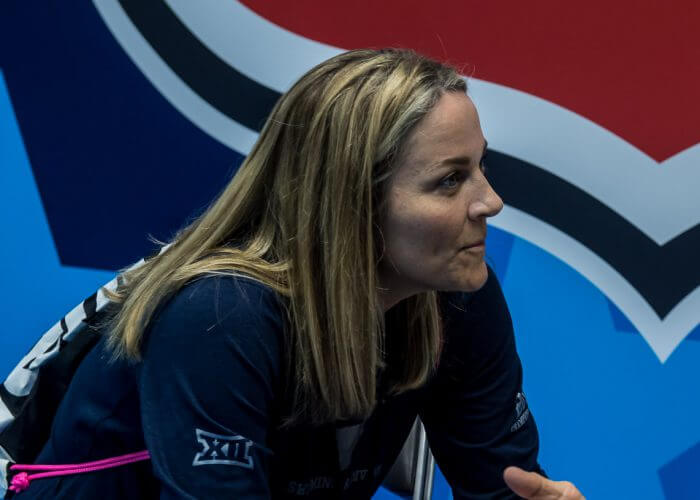
Carol Capitani; Photo Courtesy: Peter H. Bick
Texas had finished third at the 2021 meet, the first time one of Capitani’s teams had earned a team trophy (given to the top four teams) at the national championships. “Their goal was to go for a trophy again,” Capitani said. “I think some people thought last year, this COVID year doesn’t really count. But our team felt that it counted, and we swam pretty well last year. I thought this year, if we swim well, we should be able to earn a trophy, and if we swim out of our minds, it would be great to be top-three.”
That’s exactly what happened.
Based on swimming competition only, the Longhorns were seeded to finish sixth at this year’s championships, but huge time drops helped Texas outscore its projections by 85 points, while Longhorn divers chipped in another 90 huge points. Both of those totals were higher than any other team. That allowed Texas to finish the meet with 406 points, barely edging out Stanford’s third-place total of 399.5.
The all-around most valuable swimmer for Texas was junior Kelly Pash, who placed third in the 200 freestyle and fifth in both the 200 IM and 200 butterfly and also swam the critical leg on four relays.
“I think we’re pretty fortunate when you have someone like the person who Kelly is. She is one of the strongest leaders of our team, not just because of her versatility, but because of her attitude,” Capitani said. “I think the reason she is so good at so many events is she does not like to get bored.”
Another huge performer for this year’s Longhorns group was sophomore breaststroker Anna Elendt, a native of Dreieich, Germany, who was coming off a pair of B-final appearances at the 2021 NCAA Championships and an appearance in the semifinal of the 100 meter breaststroke at the Tokyo Olympics. Elendt took a step forward during her second year with Texas, finishing fifth in the 100 breast (after swimming the quickest time of the meet in prelims) and then second in the 200 breast.
“She’s just really grown into her confidence this year. I think she really embraced the sport and kind of became a student of the sport,” Capitani said. “She worked really hard last year, and I think it was a lot on her plate: English, new school, new country, new life…and she really just saw herself as a ‘sprint breaststroker.’ I think she saw herself as a 50 breaststroker who could swim the 100, and I think she’s really learned how to be a 100 breaststroker who can move up to a 200 and down to a 50.”
Heading into the final day of the meet, Texas looked ticketed for a third-place finish before a trio of events broke in the Longhorns’ favor. First, Pash and teammates Emma Sticklen and Olivia Bray all qualified for the 200 fly A-final, and then Jordan Skilken, Janie Boyle and Paola Pineda all qualified for the championship final in platform diving.
Finally, two Texas swimmers posted remarkable performances in the final afternoon heat of the 1650 freestyle: Erica Sullivan, the Olympic silver medalist in the 1500 meter free, and fifth-year senior Evie Pfeifer. Sullivan, who Capitani called “bright light and a big star with equally as big heart,” was racing the clock to try to post a time that would be competitive with the top-seeded swimmers racing at night, while Pfeifer was swimming her last race.
Both swimmers recorded impressive efforts, with Sullivan finishing second overall and Pfeifer fourth. After they finished, Texas swimmers crowded behind the blocks to embrace their teammates.
“To have that 1-2 in the afternoon heat and get our night started, that was very special,” Capitani said. Just a few hours later, the coach and her team would have much more to celebrate as Texas received a well-earned second-place trophy.
…………………………………………………………………………………………………………………….
DIFFERENT PATHS WITH SIMILAR DESTINATIONS
Taylor Ruck, a junior, was coming off of two Olympic redshirt years. Regan Smith, a freshman, deferred her enrollment until after the COVID-19 shutdown and Olympic postponement. But they both arrived on Stanford’s campus with big goals.
Smith was looking to continue her teenage success in the water while Ruck was aiming to return to the potential seen in her teenage years.
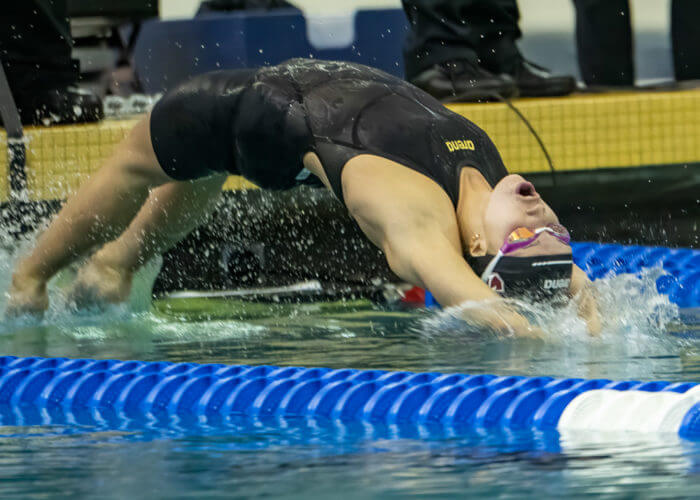
Photo Courtesy: Peter H. Bick
Both Ruck and Smith started this year’s NCAA Championships with an all-Olympian 800 free relay win (6:48.30 with Torri Huske and Brooke Forde), then they captured their first NCAA individual championships this season (Ruck 200 free, Smith 200 back), helping lead Stanford to a third-place finish—just 6-1/2 points outside of second.
Smith was somewhat expected to win one of her individual events, though doing a 200 backstroke-200 butterfly double is risky in that regard. But Smith used spectacular turns to win the 200 back in 1:47.76 and hold off fellow Olympian Phoebe Bacon, the defending NCAA champion.
Smith said the hardest part for her was trying not to listen to expectations.
“It’s definitely hard sometimes, and something I have been struggling with,” Smith said of the pressure she faces. “But I’m thankful to have a great team behind me that has my back. I just go out there and do what I know how to do. People told me that (NCAAs) is just different, and I didn’t know what that meant until I got here. This meet has been different than any meet I’ve ever been to, but it’s been so much fun.”
After the 200 backstroke, Smith returned for the 200 butterfly and came back from a huge deficit to tie defending champion Olivia Carter for second place behind Virginia’s Alex Walsh. It was a stunning double to end Smith’s first NCAA Championships on a high note.
* * *
Meanwhile, Ruck came into the NCAA meet with a different vibe. She wasn’t expected to win anything. Stanford relays would need her, and she performed extremely well in all of them.
But Ruck put together a dominating performance in the 200 freestyle to earn her first individual victory.
Nobody really knew what to expect from that event. After Penn transgender swimmer Lia Thomas won the 500, she came into the 200 free as the top seed. But this race was much closer on paper, which showed Thomas, Cal’s Isabel Ivey and Ruck all in the hunt.
Once the finals started, though, the race belonged to Ruck.
The Stanford junior led from start to finish and held off the rest of the field to earn a convincing victory in 1:41.12, a half-second ahead of Ivey. Thomas finished in a tie for fifth, 2.28 seconds off the pace.
“Honestly, I just came into this meet wanting to focus on my own performances. I know there was a bit of chatter about Lia being here. But usually I just try to zone everything out and focus on what I can do to be the best I can be on that very day,” Ruck said. “Coming into today, I was just thinking competition is competition. I was excited to be able to race some people who were so fast.”
For Ruck, this was more than just a first NCAA victory, it was a signal to herself and the world that she is back to elite form.
She had struggled with an eating disorder that has kept her from the potential she had after being a teen in the Olympics and beating Katie Ledecky and Ariarne Titmus head-to-head at the Pan Pacific Championships in 2018.
Now, Ruck is back and happy to share her story to help others who might be struggling. Winning a title proved to herself that anything is possible. That is something she wants everyone to see in themselves.
“It certainly has been a journey since Pan Pacs. Lots of downs, more than the ups. I think the past few years have just been very hard for everyone,” Ruck said. “Everyone has had their own path and journey through it, and mine happens to be through an eating disorder.
“I’m happy to say I’m more on the other side of that struggle, and I’m open to talking about it with anybody. If anybody is going through the same things, it does get better.”
And with Ruck possibly coming back for another year and Smith just starting, it is going to get better for the Cardinal, too.



